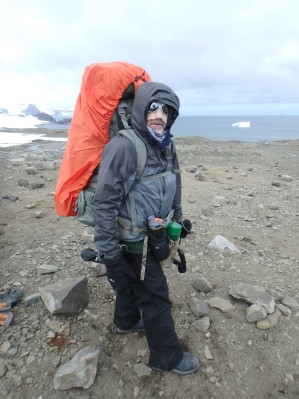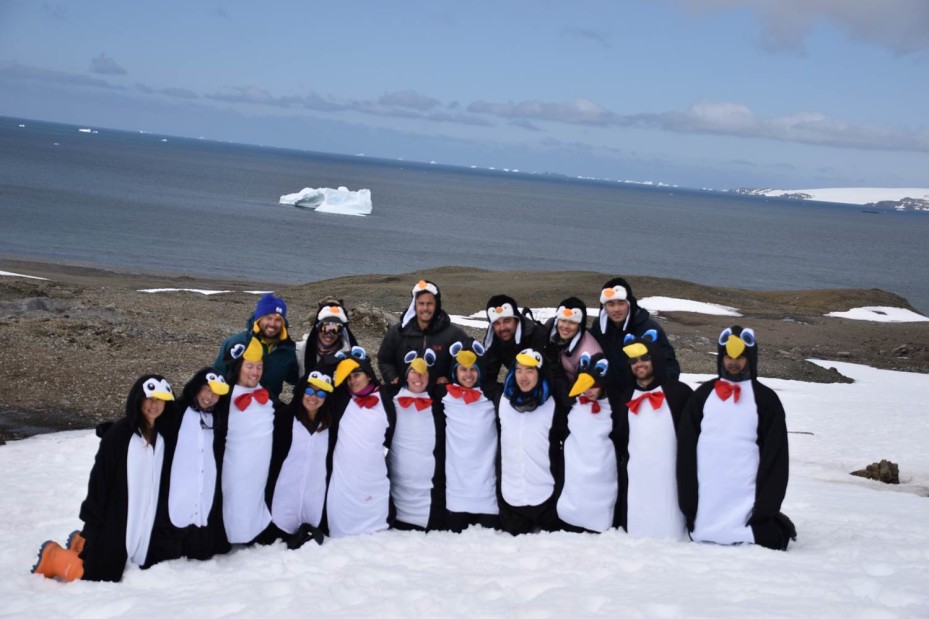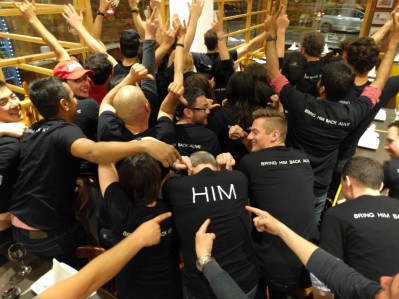The majority of my winter break from Wharton was spent travelling over 15,000 miles for eight days and seven nights of camping in Antarctica. Specifically, King George’s Island, where I, along with veteran venture guides from Vertical, CL, 3 leadership Fellows from the McNulty Leadership Program at The Wharton School and 36 MBA students hiked in slushy show and mud, changed camp four times, built (and rebuilt) snow walls and carried a 50+ pound backpack. My family thought I was nuts!
The trip is one of many offered to MBA’s by the McNulty Leadership Program. In the service of learning by way of stretch experiences, students go to new and different places and coordinate living in a very different environment. Leadership fellows lead daily debriefs with assistance from the guides and, occasionally, a faculty member. A guide trails each group as it navigates through a day’s trek, providing simultaneously wide discretion and a human safety net. Each day comes with a different team leader as leaders are rotated on/off through each group.
I lived and worked as a member of the venture, debriefed a team a day, and, as the ‘occasional’ faculty member, twice taught a case about Shackleton and his 1914-1916 expedition to and fight for survival in Antarctica. I offer below 10 metaphoric observations of my time spent in Antarctica, metaphors that resonant, for me at least, with what I have learned about leadership over nearly 40 years of studying it, teaching it, and, mainly, helping others exercise it.
1) Loving your tent: Make sure that you (and your team) have a tent, a safer time and place between work and home that provides you the opportunity to regroup and to process in between challenging days. You’ll be spending A LOT of time here so it’s best to make it a home away from home.
2) Loving (and hating) your backpack: A backpack, especially one stuffed with gear and weighing a bit over 50 lbs., resembles an inbox. It is full to overflowing and regularly needs organizing. It’s a complex relationship, but embracing its complexity frees you up to put the required energy into the relationship and spending the necessary time together.

3) The environment is what it is — Accept it: Antarctica, like competitive markets, will find your weaknesses, whatever they may be. Forget to cover your face? The sun will appear and burn, even blister your face. Forget to treat your hands? Welcome to chapping then cracking and then infection. Overdress? The exertion will make you sweat and stopping will bring a chill. Underdress? Any stop or pause will seem interminable. Exercise bad form in building a snow wall? Endure back pain. It’s like an ongoing dental exam. It just is. Attend. Do your best. Know that you missed something and that the environment will point it out’. Then, adapt and overcome.
4) Take care of yourself… and your gear: For the sake of the team, you need to keep yourself ready. At the very least, you don’t want to slow them up. So, get yourself in shape; make sure that you keep yourself well in order to play your part. It’s the least that you can do.
5) Dedicate resources to learning: This trek was in the service of learning. Only MBA students (and aging faculty) could participate. Students had to apply and, although co- curricular, i.e., not for credit, participants had to accept the learning agenda that forms the skeleton of this trek. Leadership Fellows (competitively selected and then well trained second year MBA students) oversee and facilitate the construction and development of teams. Finally, in Antarctica, those same Fellows in combination with the guides structure and facilitate daily debriefing of each team’s experience, especially as it pertains to the leader. Teams become impressively proficient in the conduct of these sessions, covering task performance, teaming, and leader performance.
6) Alphas DO play: Yes, alphas do play, hard of course. Students brought penguin outfits, performed skits on New Year’s Eve, skinny dipped in public, and took seemingly endless pictures of everything.

Provide the room for play, even encourage it. Shackleton had regimented work for all of his shipwrecked party—they put on plays, listened to music, and played soccer on the ice. He knew: to lead the work, facilitate play.
7) Small treats matter: I brought 2 bags of chocolate covered espresso beans with me for energy.. I’d hand the bag to the team I was traveling with during some stop and/or during our evening debrief. People carefully regulated their consumption of the delicacy, most needing encouragement in order to take more than a single bean and commenting on how good they tasted and expressing gratitude.
Small treats matter both in and of themselves and symbolically. They can occasion pause and provide needed moments of shared appreciation.
8) Accept love from home: To say that my wife opposed my doing this trip would understate the matter. That said, as a loving spouse, she tolerated my enhancing my fairly rigorous normal exercise routine and taught me Yoga for specific maladies that I might experience, especially for my long abused (and suffering) back. My kids, both accomplished athletes, talked to me about diet. My wife and daughters (especially my elder daughter, Ms. MMA) stuffed my Christmas stocking with carefully selected foods and supplements for the trip. I used the Yoga for days on my snow wall aching back, ate the food—occasionally ravenously, and thought of them often.
9) Mission on a t-shirt: Two pictures from the closing dinner show us all (20 something participants and fellows along with generally 30 or early 40 something guides) all wearing a black t-shirt from our first meeting as a group. On the front is an emblem, a snowy, mountainous island with “Antarctica 2016” written below it. On the back of the t- shirts appeared the words, “Bring Him Back Alive”, except on one t-shirt, mine, the one worn by the only 60 something, on which it said only “HIM”. I told folks that the t-shirts came from my family and me in order to clarify the real mission before them: namely, yes, I’m a faculty member, but I’m a human being and my family is worried about me. We’re all facing a set of challenges, now let’s get going!

10. Being fully where you are: The trek fills the day: getting ready for it, doing it, resting from it, and preparing for the next day. The gear (tent, pack, clothing) need careful tending as you put it on, take it off, pack, repack, put up, take down and food and water take time to cook, boil, and store. The concreteness and immediacy of the tasks fill your day. Such activity both fills the day and allows for other activities such as musing. What bubbles up is personal and warrants the same attention as with a dream. In mid-week, a thought came to me as if spoken during a snowy trek complete with greyness and persistent wind: ‘Your life is only a whisper on the wind.’ I stayed, almost meditatively, with the notion for much of the rest of the day, contemplating the perspective on my importance. During similar conditions the next day, came the rest of the notion, ‘But it’s MY whisper.’
Both are true for any leader—your efforts are as a whisper on the wind, but it’s your whisper’—what you do matters little in one sense and yet is everything in another. Holding both thoughts at the same time enables us all, including leaders, to avoid hubris while committing passionately to the work at hand.
Gregory P. Shea, PhD. is Adjunct Professor of Management at the Wharton School of the University of Pennsylvania and of its Aresty Institute of Executive Education, Adjunct Senior Fellow at the Leonard Davis Institute of Health Economics at Wharton, Senior Consultant at the Center for Applied Research, and a principal in the Coxe Group, an international consulting firm serving the design professions. He is the co-author of Leading Successful Change and author of Your Job Survival Guide.


